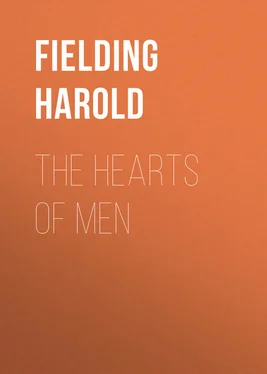Harold Fielding - The Hearts of Men
Здесь есть возможность читать онлайн «Harold Fielding - The Hearts of Men» — ознакомительный отрывок электронной книги совершенно бесплатно, а после прочтения отрывка купить полную версию. В некоторых случаях можно слушать аудио, скачать через торрент в формате fb2 и присутствует краткое содержание. Жанр: foreign_antique, foreign_prose, на английском языке. Описание произведения, (предисловие) а так же отзывы посетителей доступны на портале библиотеки ЛибКат.
- Название:The Hearts of Men
- Автор:
- Жанр:
- Год:неизвестен
- ISBN:нет данных
- Рейтинг книги:3 / 5. Голосов: 1
-
Избранное:Добавить в избранное
- Отзывы:
-
Ваша оценка:
- 60
- 1
- 2
- 3
- 4
- 5
The Hearts of Men: краткое содержание, описание и аннотация
Предлагаем к чтению аннотацию, описание, краткое содержание или предисловие (зависит от того, что написал сам автор книги «The Hearts of Men»). Если вы не нашли необходимую информацию о книге — напишите в комментариях, мы постараемся отыскать её.
The Hearts of Men — читать онлайн ознакомительный отрывок
Ниже представлен текст книги, разбитый по страницам. Система сохранения места последней прочитанной страницы, позволяет с удобством читать онлайн бесплатно книгу «The Hearts of Men», без необходимости каждый раз заново искать на чём Вы остановились. Поставьте закладку, и сможете в любой момент перейти на страницу, на которой закончили чтение.
Интервал:
Закладка:
Go by the morning train, leave Rangoon Station when the sun is shining on the great pagoda, and you will see men and women and children lean out of the carriage windows to salute it, to murmur a prayer. The Mahommedan spreads his cloth and turns to Mecca, and prays no matter where he may be. He is not ashamed. It does not seem to him strange. He does it absolutely naturally, as all these people do all the things that pertain to their faiths. Neither his fellow-believers nor the adherents of other faiths wonder.
The Hindu may hate the Mahommedan for social reasons, and the Buddhist may hate both, but they do not despise each other for being religious.
It would never occur to a Hindu to despise or jeer at a Mahommedan for spreading his cloth at the street corner and praying. He thinks the faith a mistaken faith, he would not have it. But if a man is a Mahommedan it is right of him to pray, of course.
I have never heard, no one has ever heard, one Oriental jeer at another for being religious, for obeying the commands of his faith. But I have heard Christians and teachers of Christianity do so very often. We will jeer at a Mahommedan for praying, at a Hindu for observing his caste, at a Buddhist for raising his hands in honour to his pagoda, at a Chinaman for protecting the graves of his fathers. For in the West we have never known what real religion is. We have it not ourselves, and so we cannot recognise and honour it in others. No brave man will mock at another brave man, though an enemy; no one who has loved mocks at another lover, though he love strange things. Only those jeer who do not know, and the Christians of the West jeer at the faiths of the East, at the simple natural religion of the people, because they know not what religion of the heart can be.
In Europe, what difference does a man's faith make? None. He may live a lifetime with other men and no one know or care what his faith may be. Unless he is a poor man and in need of mission, it is considered impertinence to ask. But here in the East a man's faith is everything. You cannot get away from it even for a moment. It is an essential part of him.
There is another thing that strikes one very soon. These Oriental religions have little or no organisation. Here in Europe there is nothing so organised as religion. Consider the Catholic faith and the organisation of Rome. It is a marvel of government, of very strict government indeed. And the other forms of Western Christianity are not much behind. The Greek Church is organised as a branch of Government. So, too, to a lesser extent is the Anglican Church, and if the Dissenting bodies, as we call them, are not connected with the State, they have nevertheless a strong system of government.
These organisations are not now, of course, so strong as they were. They used to drag the men into religion by force, by State aid, they used to insist on conformity and punish laxity of observance. That is now gone, but a strong and continuous pressure still exists, exerted by the Churches in many ways. All Churches in Europe are always having "missions." Our great cities are full of them, and the country is not free of them. There has to be a continual shepherding of the flock or the Church might dwindle sadly. Men have to be preached at and caught one way or another. All through Europe immense sums are spent yearly in Christianising the poor.
In the East nothing of this exists. There is no head of Hinduism; that of the Sultan in Mahommedanism is merely nominal; how slight the organisation is of Buddhism those who have read my former book will know.
Hindus are guided by the race of Brahmins, who in turn are guided by no one. They are a great community themselves, without any organisation or binding authority. They need no Pope, no Acts of Uniformity. They are Brahmins because they are so. And so it may be said in general. Faiths in the East require no strong organisations to hold them together. Religion is innate in the believers. It seems wonderful. And they have no missions. If a man feels the need of faith he will seek it and obtain it. It is there for him if he will come. And all do come. How many millions in Europe, even in England, have no religious usages? Can you in the East find one man?
When you think of Europe and its faiths you seem to be in a garden where the hedges are carefully clipped and the flowers are trained and pruned, and where you may not walk on the grass. It is all order, and method, and restriction, for the flowers are exotics and would die without the tending, they would vary if they were not kept true to type. But the East is Nature's garden, where the flowers grow wild everywhere; no one tends them or cares for them, but each grows his own way, developes his own power and strength, from the lowest grasses to the gorgeous orchid or the poison lily.
Therefore it may be that in this East, this country whence all religions have come, where the whole air breathes of faiths and all life is full of them, the man who has lost his early beliefs may learn new ones. There is so much to choose from, so many varieties of thought and emotion.
In this Empire of ours are all the great religions. It is the home of Brahminism, of the mystical forms of Hinduism, beyond which it has never spread. There are more Mahommedans here than under the Sultan of Roum. There are the Parsees here, fugitives long ago from Persia on account of their faith, the only sun worshippers who are left. There are Jews who came here no one can tell how long ago, there are Christians who date back may be eighteen centuries, there are Armenians and Arabs. Within this Empire live the only race professing a Buddhism that is pure and without superstition; and beside these there are a hundred other cults, superstitions, or religions, call them what you will.
From the spirit worship of the Shan plateau to the dignified philosophic theories of the Brahmo Somaj is a space as wide as the world can show, yet may it be bridged with religions that differ but by small degrees till the whole be passed.
If anyone want a faith here are enough and to spare. "Therefore," thought the boy, who had now become a man, "I will seek here for what I want. I know what I want. I have it clearly before me. I have even written it down. It is not as if I was undertaking a blind search for something of which I was not sure. These are my three essentials: a reasonable theory of the universe, a workable and working code of conduct, a promise in the after life that gives me something to really desire, to really hope for, to be a haven towards which I may steer. I will take each subject, each section of a subject, separately and read it up. I will read up these faiths from books, I will study them as I can from the people, and I will see what they are. Surely somewhere can be found what I desire, what I desire so greatly to find."
CHAPTER VII
THE WISDOM OF BOOKS
Therefore the man got books and read them. He read books on Hinduism, many of them; he read the Vedas and the sacred hymns. He learnt of Vishnu and Siva, of Krishna and the milkmaids. He found books on caste and read them, of how these were originally four castes which subdivided. He read of suttee and the car of Juggernauth. He then turned to Mahommedanism and the life of Mahommed. He read the Koran. He learned the early history of the faith, of its rise, of the glory of its result, of the fall of its great Empire. He saw it had much to do with Judaism, there were great similarities, there were also differences. He read of Parseeism, that taught by Zoroaster which they call fire worship; he read of Jainism, of the cult of the Sikhs, of many another strange faith; he learned of the spirit worship of the aboriginal tribes among the mountains, of Phallic worship and its monstrosities.
He read of Confucius and his teachings, of Laotze and his doctrines, of ancestor worship among the Chinese, of Shintoism in Japan.
Читать дальшеИнтервал:
Закладка:
Похожие книги на «The Hearts of Men»
Представляем Вашему вниманию похожие книги на «The Hearts of Men» списком для выбора. Мы отобрали схожую по названию и смыслу литературу в надежде предоставить читателям больше вариантов отыскать новые, интересные, ещё непрочитанные произведения.
Обсуждение, отзывы о книге «The Hearts of Men» и просто собственные мнения читателей. Оставьте ваши комментарии, напишите, что Вы думаете о произведении, его смысле или главных героях. Укажите что конкретно понравилось, а что нет, и почему Вы так считаете.












